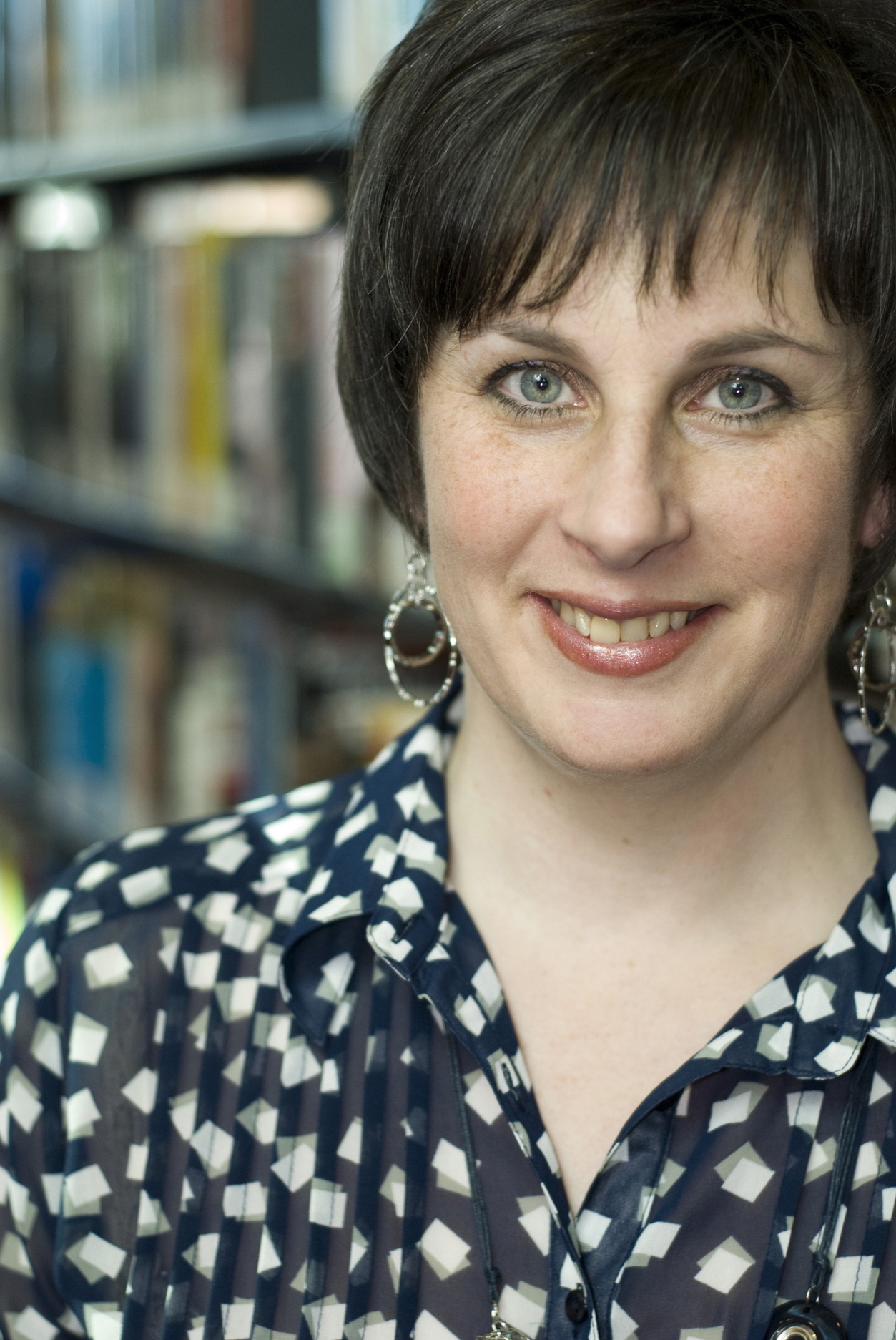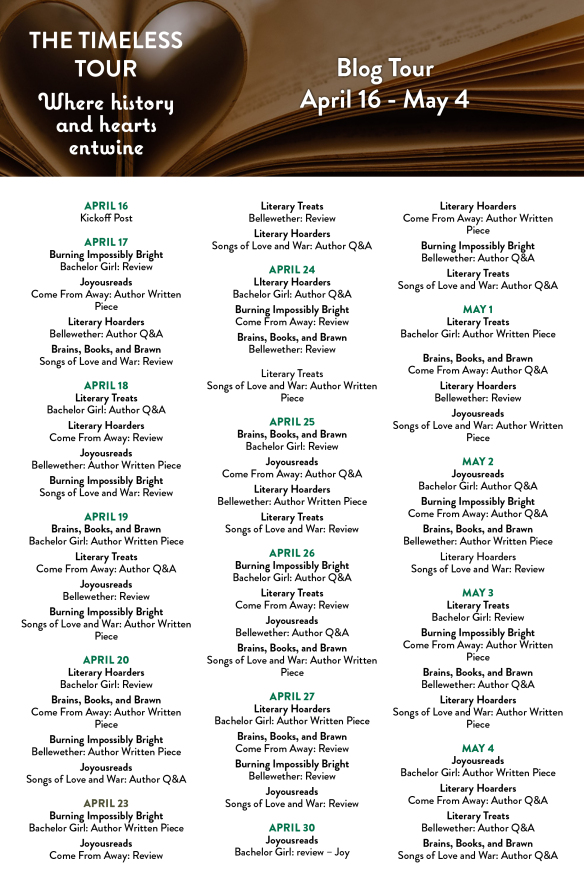
Q&A with Susanna Kearsley
For Simon & Schuster Canada's Timeless Tour we had the pleasure of asking the authors questions. Today, we have Susanna Kearsley, author of Bellewether, answering the Literary Hoarders' questions:
Do you have a music playlist that you can think of for Charley in Bellewether?
The Bellewether playlist on my iPod is actually a long one, with songs I gathered during the writing of the book. I hear a song on the radio and it just connects with a character in my mind for whatever reason, and that character will start moving around and a scene begins to form in my imagination, so when I get a chance I download that song to the iPod and listen to it between writing sessions. Each character, oddly enough, usually ends up having “favourite” singers or groups they connect with. Jean-Phil, the historical hero of Bellewether, was very much a One Republic sort of guy, while Charley liked Christina Perri and Taylor Swift. Here are five of the songs from her part of the playlist:
Human – Christina Perri
Begin Again – Taylor Swift
The Words – Christina Perri
Save Myself – Ed Sheeran
Everything Has Changed – Taylor Swift
Do you write with music playing in the background? Or do you work in total silence?
There’s no such thing in my house as total silence, but if anyone’s talking or playing music it will pull me out of the work. So I either have to be alone, with only the dog, or everyone else has to be asleep. Otherwise, I wear headphones, and play white noise to shut out the surrounding sounds.
What does your writing space look like?
When we moved into this house nearly twenty years ago, I claimed the dining room as my writing room, filled one long wall with Ikea bookcases from floor to ceiling, and put my father’s old desk against another, and that’s where I write. It can get cluttered while I’m working, but it’s a room of my own, and I love it.
How do you celebrate the publication of your latest books?
For me, it’s always a celebration to get out of my writing room, put on proper clothes, and come meet the readers who, for me, close the circle of the process. Samuel Johnson once said, “A writer only begins a book. A reader finishes it.” And a book never feels finished, for me, until I’ve placed it in the reader’s hands.
Who was your most influential mentor?
I don’t know that I’ve ever had a mentor in the traditional sense of the word. Certainly early in my career I didn’t have one. I just soldiered through the best way I knew how. But there have been writers who gave me encouraging words along the way, although they may not remember having spoken them, or known at the time the effect those words had on me. Evelyn Anthony, Jack Higgins, Maeve Binchy, Bernard Cornwell, Ian Rankin, Dame P. D. James, Annie Ashurst (Sara Craven), Peter Robinson, Linwood Barclay and others, all took time to give words of advice and support when I very much needed them. And in particular, Diana Gabaldon has always been extremely kind and generous to me. It’s because of her, in fact, that I’m now writing my first novella. The idea would never have occurred to me if she hadn’t suggested it one evening over dinner.
What is a question you wished was asked of you, but has never been asked?
I find all questions interesting, as long as they’re asked from a place of genuine curiosity and respect. I particularly enjoy being asked questions about craft and process, because it’s often assumed that writers of so-called popular fiction are somehow less concerned with these matters than our so-called literary cousins, when in my own quarter century of experience (and speaking as someone who has friends writing across many genres, including literary fiction) the craft is the craft.
Who has been your most favourite character to write, and why?
It would be impossible for me to choose a favourite, although I will say that some have definitely lodged in my heart like old friends. For example, Colonel Patrick Graeme, a real-life character introduced in my book The Winter Sea, who was intended to add a brief bit of side colour, took on a much larger role and refused to stand down when that book was completed, becoming the reason I followed those characters into another book, The Firebird, and I suspect he’s a large part of the reason why I’ll be returning to those characters in my next book, The Vanished Days.
What keeps you writing?
It’s just the way my brain is wired. I can’t not do it.
Frances Itani often asks other writers for CBC Books’ Magic 8 Q&A, “Describe a walk that would and could feed your imagination and your writing. In what part of the world would this walk take place?”
In my case, it’s dependent on where the book is set, because my imagination is generally fed by the location where the book takes place. Walking in the footsteps of my characters, through their buildings and their landscapes, is a key part of my process, and the characters will often come to life and start to speak and create scenes in my imagination when I’m standing somewhere that I wouldn’t have discovered if I hadn’t gone to do the on-location research. I made several trips to same areas of the north shore of Long Island that became the settings for Bellewether, and I walked through those woods and those village streets over and over again, and for Bellewether, those were the walks that I needed. For the novel I’m just starting now, the walk that would best feed my imagination would be up through the closes and wynds to the castle in Edinburgh’s Old Town, in autumn.
Has there been a Canadian author that influenced you? How or why not?
Yes, there have been several. Four immediately come to mind: Gregory Clark, a former newspaperman whose stories can take me from laughter to tears on the same page and are collectively a master class in how to engage a reader’s emotions with a few unforgettable images; Lucy Maud Montgomery, who gave us not only Anne of Green Gables but, in Rilla of Ingleside, probably one of the most poignant novels of the Canadian home front during the First World War, and in The Blue Castle, a heroine I’ve always loved and related to even more than I do Anne; Arthur Hailey, who wrote blockbuster thrillers (Airport and Hotel and The Moneychangers, among others) that got turned into blockbuster movies and filmed for TV, and his success reminds me that popular fiction has always been a part of CanLit; and Thomas H. Raddall, whose historical novels brought Canada’s past alive for me with an authentic blend of romance and adventure.
Thank you so very much Susanna! I love your playlist – I love Christina Perri too. :-) Thank you for sharing your what your writing space looks like and your writing influences (love Maeve, miss Maeve!) and I look forward to your novella!

Here’s an in depth schedule of the Timeless Tour so you can see there is plenty more planned for the Literary Hoarders and the others participating! We hope you enjoy your time with us on this Tour.



What a great Q&A, Penny — thank you to both you and Susanna for all your time on this!! I love hearing about how writers work, and getting glimpses behind the scenes. 😊
Thank you Jennifer – and yes! Thank you Susanna for taking the time to answer my pile of questions! I do love hearing how writers work, what their writing space looks like, etc.
Oooh, I love Susanna’s playlist! So many great songs! :D Great questions, Penny, and I really enjoyed reading Susanna’s answers! :)
I know eh? Great playlist! I’m thankful to Susanna for spending the time answering the questions for sure!